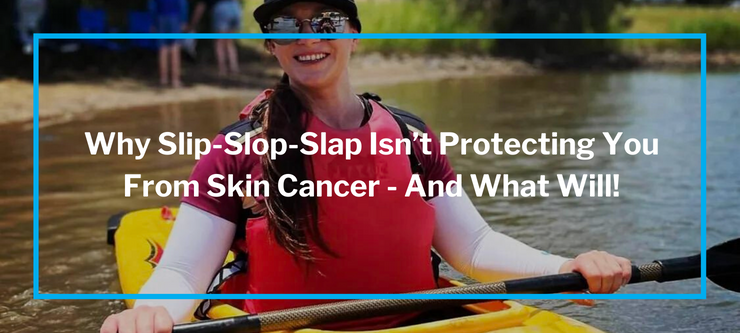We’ve heard slip-slop-slap since we were freckle-faced kids, but a t-shirt and a ‘slop’ of sunscreen haven’t been enough to slow the rate of skin cancer. Why? Partly because that shirt isn’t as effective as you think.
Around 1 million people are diagnosed with skin cancer or melanoma each year, and almost 2,000 die from what is an entirely preventable disease.
Slip, slop, slap isn’t a perfect system.
We’re fans of the slip-slop-slap trifecta, but we also know it’s not doing a stellar job at protecting us from skin damage. Sunscreen lasts around two hours before the chemicals break down and its protection declines. Water and sweat can make sunscreen ineffective less than an hour after you apply it!
Clothing is protective, but not perfect; regular fabric has a loose weave and can’t deflect UVA and UVB rays completely. Your nice cotton shirt is basically the equivalent of wearing SPF-5 sunscreen!
According to the Skin Cancer Foundation, fabric must have a minimum UPF (Ultraviolet Protective Factor) of 30 to protect you from UV exposure. It actually recommends UPF 50+ clothing for the highest rate of sun protection.
The flaw in slip-slop-slap is that people aren’t ‘slipping on’ clothing that can properly protect skin from the sun damage that leads to melanoma and skin cancer.
The best protection is UFP50+ clothing
Specially-designed sun protective clothing like SParms has the Skin Cancer Foundation seal of approval for the best defence against damaging UVA and UVB rays. (If you’re imagining wearing a wetsuit in the middle of summer, we promise that’s not how SParms clothes work!)
Our sun-protective sleeves, wraps, gloves and shirts are soft, breathable and lightweight. The fabric is designed to wick moisture away (perfect for Aussie summers) and dries quickly. It doesn’t need any special treatment either; just pop it on cold wash and hang out to dry.
SParms sleeves are one of our most popular items because they’re so easy to keep in the car or beach bag and pop on when you have a day in the sun. They’re perfect for slipping under shirts for golfers, cyclists and runners, or recreationally when you’re gardening, fishing or walking – if it’s in the sun, sun sleeves are ideal!
To provide more protection for your shoulders, you can use a wrap that covers your arms, shoulders and upper back. Wraps sit comfortably under your shirt and allow free range of motion for your arms.
If you want all-over protection from UVA and UVB light, you can add a UPF 50+ long-sleeve base layer shirt under your regular t-shirt.
It’s too hot for long sleeves, right?
The summer sun is hot, and we know people worry about overheating from wearing long sleeves. That’s why our fabrics are made with patented cooling technology that actually cools your skin by 3 to 5 degrees Celsius!
The cooling factor makes SParms sun protective clothing a better option than regular clothes on a hot day. Or, you can actually warm up with our range of sun protective shirts that use heat-retaining yarn to keep you 20% warmer than regular cotton.
How to take slip-slop-slap to a new level
Covering your skin with clothes and a hat, and slopping on sunscreen still work. But it’s more effective if you upgrade your clothing to give better all-round protection from the sun.
As we battle high levels of UV radiation during the summer – where sunburn can happen in less than 11 minutes on a summer day – sun protective clothing is our best defence against skin damage, preventable cancers and melanoma.
Sun protective clothing comes in a huge range of colours, styles and features, for kids through to XXL, so we can protect ourselves and our kids starting as early as possible.
The best part? Besides avoiding disease down the track, you won’t have to reapply sticky, greasy sunscreen on you or the kids all throughout the day. UPF 50+ clothing is a better all-around skin protector because it filters out both UVA and UVB light, which many sunscreens don’t. It’s also fewer chemicals, less mess, and better for the environment.
Slip-slop-slap works when you add UPF50+ clothing – otherwise, you’re not giving your skin the protection it really needs.


0 comments